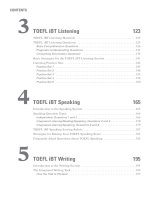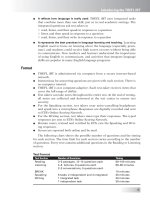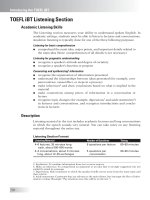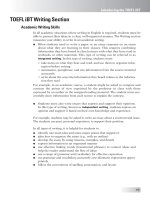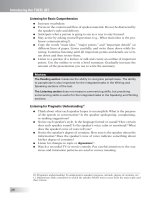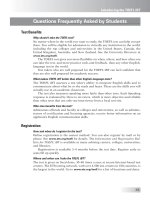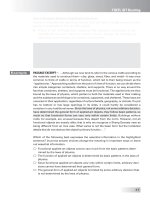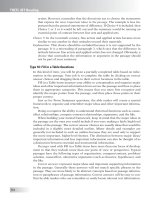The official guide to the toefl ibt third edition part 49 potx
Bạn đang xem bản rút gọn của tài liệu. Xem và tải ngay bản đầy đủ của tài liệu tại đây (90.91 KB, 7 trang )
rize the examples from the listening. There are only very minor errors in lan-
guage use, but they do not prevent her response from being understood.
Play Audio Track 38 to hear a mid-level response for Question 4.
Rater’s Comments
The speaker sustains his response throughout. His pronunciation and intonation
is affected by his first language. These pronunciation errors make it hard to know
what he means. The speaker identifies the concept and the two examples, but
with inaccuracies. Instead of summarizing each experiment, he combines the
summary of both experiments. This causes him to incorrectly conclude that you
make more mistakes when you are being watched while tying your shoes. Addi-
tionally, the speaker sometimes stumbles when trying to form basic words
(slowlier), which shows a moderate control of grammar and vocabulary.
Question 5
Track 28 Listening Script
Narrator
Listen to a conversation between a student and her geology professor.
Man
Mary, I’m so glad I ran into you.
Woman
Oh hello, Professor Jensen.
Man
Listen, I know it’s short notice . . . and maybe you’ve already made plans for spring
break . . . but . . . one of my students just dropped out of the field trip to the Smithson
River Caves. You’re next on the waiting list, so now there’s room for you to come
along.
Woman
You’re kidding!
[disappointed]
I didn’t think there was a chance . . . and . . . well, it’s a
three-day trip, right? I agreed to spend next week helping Professor Clark set up the
new museum exhibition. I think she’s really counting on me.
Man
Yeah, three days. But you know . . . if you’d rather come on the field trip, why not
speak with her and see if she has anyone to replace you?
Woman
Yeah, I’d hate to miss out on the caves. I’ll definitely ask Professor Clark if there’s
someone else who could help her.
Man
You know . . . we don’t leave until Wednesday. If you still have to help out, any chance
you could get the museum setup done before then?
327
Answers, Explanations, and Listening Scripts
328
TOEFL iBT Practice Test 1
Woman
Oh yeah . . . not until Wednesday . . . so then yeah . . . maybe that’s possible too.
Narrator
The speakers discuss two possible solutions to the woman’s problem. Describe the
problem and the two solutions. Then explain what you think the woman should do
and why.
Preparation time: 20 seconds
Response time: 60 seconds
Important Points
The problem the student faces is a conflict between an earlier commitment to
help with a museum exhibition setup and a more recent opportunity to go on a
field trip led by one of her professors. She could talk to Dr. Clark about finding a
replacement to help with setting up the museum exhibition. As an alternative,
since the field trip doesn’t start until later in the week, the student could try to
finish setting up the exhibit before the field trip.
After summarizing the problem and solutions, you should choose the solution
you think is best and give a detailed reason. For example, you could say that you
think the student should stay to set up the museum exhibit because she should
honor the commitment she made to Dr. Clark.
Sample Responses
Play Audio Track 39 to hear a high-level response for Question 5.
Rater’s Comments
There are minor pronunciation and intonation errors, but they do not prevent the
speaker’s response from being understood. She uses connecting words to mark
the progression of ideas. Her control of grammar and vocabulary is evident in the
way she efficiently summarizes the situation from the listening. The speaker
clearly identifies the problem and both solutions. She organizes her response, so
it is easy to follow her ideas from one to the next. She indicates her opinion of
what the student should do. Although she runs out of time before she can explain
why she holds that opinion, it is clear that she understands the task.
Play Audio Track 40 to hear a mid-level response for Question 5.
Rater’s Comments
The response is generally understandable. The speaker sustains speech through-
out the response time. However, the sense of hesitation in the way the response is
delivered requires some listener effort. The choppy delivery sometimes makes it
difficult to know when one sentence or idea ends and when others begin. The
speaker makes a number of errors with simple grammatical structures (very like
to, let her to take, make somebody to replace her). Overall meaning, though, is not
greatly affected by these errors. The speaker identifies the problem and describes
the two solutions. A higher-level vocabulary would have been helpful to more effi-
ciently summarize the situation. The problems and two solutions are summa-
rized with too much detail, which prevents the speaker from having time to state
her preferred solution and give a reason for it.
Question 6
Track 29 Listening Script
Narrator
Now listen to a part of a talk in an economics class.
Professor
So, let’s talk about money. What is money? Well, typically people think of coins and
paper “bills” as money . . . but that’s using a somewhat narrow definition of the term.
A broad definition is this:
[slowly]
money is anything that people can use to make pur-
chases with. Since many things can be used to make purchases, money can have
many different forms. Certainly, coins and bills are one form of money. People ex-
change goods and services for coins or paper bills, and they use this money . . . these
bills . . . to obtain other goods and services. For example, you might give a taxi driver
five dollars to purchase a ride in his taxi. And he in turn gives the five dollars to a
farmer to buy some vegetables . . .
But, as I said, coins and bills aren’t the only form of money under this broad defi-
nition. Some societies make use of a barter system. Basically, in a barter system peo-
ple exchange goods and services directly for other goods and services. The taxi driver,
for example, might give a ride to a farmer in exchange for some vegetables. Since the
vegetables are used to pay for a service, by our broad definition the vegetables are
used in barter as a form of money.
Now, as I mentioned, there’s also a second . . . a narrower definition of money. In
the United States only coins and bills are legal tender—meaning that by law, a seller
must accept them as payment. The taxi driver must accept coins or bills as payment
for a taxi ride. OK? But in the U.S., the taxi driver is not required to accept vegetables
in exchange for a ride. So a narrower definition of money might be whatever is legal
tender in a society, whatever has to be accepted as payment.
Narrator
Using points and examples from the talk, explain the two definitions of money pre-
sented by the professor.
Preparation time: 20 seconds
Response Time: 60 seconds
Important Points
Under the broad definition, money is anything that can be used as payment (as a
medium of exchange), e.g., coins/bills and barter. If you take a taxi ride, you could
use vegetables as payment for the cab ride. Under a narrower definition, money
is anything that must be accepted as payment (legal tender). In the United States,
coins and bills are legal tender. A taxi driver must accept coins and bills as pay-
329
Answers, Explanations, and Listening Scripts
330
TOEFL iBT Practice Test 1
ment for the taxi ride. Vegetables and credit cards are not legal tender in the
United States, so the taxi driver does not have to accept these as payment.
Sample Responses
Play Audio Track 41 to hear a high-level response for Question 6.
Rater’s Comments
The speaker’s pronunciation and intonation are highly intelligible. She speaks a
little too quickly at times, but the overall meaning is not lost. Her words and
ideas flow easily from one idea to the next. She uses complex grammatical struc-
tures and a wide range of vocabulary. The speaker fluently summarizes the stim-
ulus accurately recounting the broad and narrow definition. Her response is
detailed and sustained. She spends too much time summarizing the first defini-
tion and example, so she does not fully explain the second definition and exam-
ple. However, it is obvious from the apparent ease in which she speaks that she
understands the concept and is able to talk about it.
Play Audio Track 42 to hear a mid-level response for Question 6.
Rater’s Comments
The speaker’s pronunciation is generally clear. She sustains speech and continues
to try to elaborate her ideas. The hesitance and choppiness indicates a lack of
control of vocabulary and grammar. This significantly affects the overall intelligi-
bility of the response. She conveys some relevant details including an almost
accurate summary of both definitions of money. However, her response is clearly
incomplete. The speaker’s struggle to find the right words to convey her ideas pre-
vents her from efficiently using her time. Neither of the examples is included in
the response. Most of her ideas are underdeveloped.
331
Answers, Explanations, and Listening Scripts
Writing
Listening Script, Topic Notes, and
Sample Responses with Raters’ Comments
Use the Integrated Writing and Independent Writing Scoring Rubrics on pages
200–201 and 209–210 to see how responses are scored.
Writing Based on Reading and Listening
Track 30 Listening Script
The following is the script of the lecture that you heard and were asked to sum-
marize.
You know, often in science, new findings force us to re-examine earlier beliefs and as-
sumptions. And a recent study of meerkats is having exactly this effect. The study ex-
amined the meerkat’s behavior quite closely, much more closely than had ever been
done before. And some interesting things were found . . . like about eating habits . . . it
showed that typically meerkats eat before they stand guard—so the ones standing
guard had a full stomach! And the study also found that since the sentinel is the first
to see a predator coming, it’s the most likely to escape . . . because it often stands
guard near a burrow, so it can run immediately into the burrow after giving the alarm.
The other meerkats, the ones scattered about looking for food, are actually in greater
danger.
And in fact, other studies have suggested that when an animal creates an alarm,
the alarm call might cause the other group members either to gather together or else
to move about very quickly, behaviors that might actually draw the predator’s atten-
tion away from the caller, increasing that animal’s own chances of survival.
And what about people—what about some human acts that might be considered
altruistic? Let’s take an extreme case, uh, suppose a person donates a kidney to a rel-
ative, or even to a complete stranger. A selfless act, right? But . . . doesn’t the donor
receive appreciation and approval from the stranger and from society? Doesn’t the
donor gain an increased sense of self-worth? Couldn’t such non-material rewards be
considered very valuable to some people?
Question
Summarize the points made in the lecture you just heard, being sure to specifi-
cally explain how they cast doubt on points made in the reading.
Topic Notes
You should understand the meaning of altruism and altruistic acts. The defini-
tions are given in the reading: altruism describes behavior that is the opposite of
selfishness; it is behavior that benefits another individual or the group with no
reward. The lecturer questions whether the examples meet the definition.
A high-scoring response will include the following points made by the lec-
turer:
Point Made in Reading Contrasting Point from the Lecture
Human organ donors gain The donors receive appreciation and
nothing from their action. approval from the rest of society.
Sentinel meerkats go without Sentinels actually eat before the
food to stand guard. other meerkats.
Sentinel meerkats place themselves Sentinels are actually the first to
in danger from predators. escape the predators.
Responses scoring 4 and 5 discuss altruistic/non-altruistic aspects of the three
points in the table: human organ donation, meerkat sentinel eating behavior, and
meerkat sentinel ability to escape.
Sample Responses with Raters’ Comments
Score 5 Essay
The lecture completely refutes the passage. It is said in the lecture that, the
perceived acts of altruism are nothing more than sneaky methods of gaining
advantage for one’s self.Contrary to the belief in the passage that sentinels risk
their lives for the cause of the whole group, the professor says that the meerkat
sentinels are in fact less prone to outside threats. The alarm sentinels give off
causes to group to move rashly which draws the predators attention towards
them, thus drawing away the attention from the sentinels. The lecture refutes the
fact that these meerkats are altruistic in the sense that they gain nothing in
exchange of their services. In fact, researches have shown that they have a full
stomach as they perform this “altruistic” duty and have a better chance of
escaping from danger because they witness it ifrst Proffesor also offers a different
underlying motivation that causes people to believe that acts such as donating an
organ or sharing food with someone in need are altruistic. She says that people
gain appreciation as a result of such acts, which may be deemed by some much
more important than materialistic gains.
Rater’s Comments
This answer meets all the criteria for a Level 5 response to an integrated task. The
writer does a good job of selecting, framing, and interweaving points from the lec-
ture and reading, explicitly and fluently presenting accurate connections between
the relevant points. All three points made by the lecturer are included. Language
is used accurately and effectively, and the overall piece is well-organized.
332
TOEFL iBT Practice Test 1
333
Answers, Explanations, and Listening Scripts
Score 4 Essay
Baed on the lecture, meerkats actually do not sacrifice themself by becoming a
sentinel. Firstly, the meerkats that become a sentinel usually eats before. Secondly,
these meerkats usually standing guard near their burrows. As a result, when a
predator is seen, they raise an alarm and reach a safe place before the other
meerkats that hunt for food. This shows that these meerkats do not put themselves
in danger. In fact, the lecturer warned that the the alarm raised by these meerkats
could be harmfull for the other meerkats. One of the reason is that the responses
of the other meerkats to the alarm might attract attention from the predator. Based
on these reasons, meerkats can not be used as an example of a mammal that
performs altruistic behavior.
The lecture also pointed out that, it is not always true that individuals per-
forming altruistic acts gain nothings for themselves. For example, when a man
give one of his/her kidney to a family member or even a stranger, his/her self-
worth increase. He/she feels usefull for other people. Therefore, he/she gain
something from his/her action.
In sum, altruism behavior in animal and human is questioned. It is difficult for
individuals sacrificies its own interest without gain anything for themselves.
Rater’s Comments
This response includes all the main points of the lecture. The first paragraph
begins with a clear statement that sentinel meerkats do not sacrifice themselves.
There are strong concluding statements in each of the first two paragraphs that
are quite explicit about the import of the sentinel behavior and the organ dona-
tion. The connections to the reading could be stronger. The writer says that the
sentinel meerkat eats “before,” but does not make an explicit contrast to the pas-
sage which says that sentinel meerkats go without eating. The conclusion in the
final paragraph is vague (“altruism . . . is questioned”). On balance then, this
response is a level 4, with minor vagueness and omission. In terms of language,
there are a number of minor errors: “themself,” missing verb in the sentence
beginning “Secondly,” “one of the reason,” “a man give,” “It is difficult for indi-
viduals sacrificies.”
Score 3 Essay
Acording to the lecture, examinig closely to the eating habits of meerkats, these
animals are not altruistic, mainly because the sentinel before standing guard eats.
So that it has a full stomach. Another fact is that the sentinel, being the first that
sees the predator, is able to be the first in escape. Also the other meerkats that are
hunting and looking for food are the ones in danger. Considering the altruistic
human acts, the donation of body organs shouldn’t be considered like that, mainly
because when a person donates an organ he or she receives appreciation and
recognition of society.
Because of this points the lecture might make the reader doubt, mainly because

